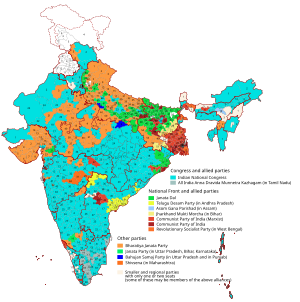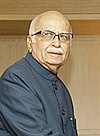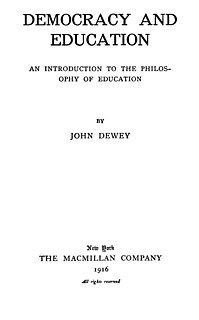
Lal Krishna Advani is an Indian politician who served as the 7th Deputy Prime Minister of India from 2002 to 2004 under Atal Bihari Vajpayee. He is one of the co-founders and a senior leader of the Bharatiya Janata Party. Advani also served as Minister of Home Affairs in the BJP-led National Democratic Alliance government from 1998 to 2004. He was the Leader of the Opposition in the 10th Lok Sabha and 14th Lok Sabha. He was the National Democratic Alliance prime ministerial candidate in the 2009 general elections.
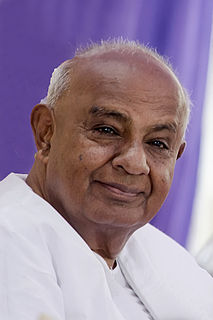
Haradanahalli Doddegowda Deve Gowda is an Indian politician who served as the 11th Prime Minister of India from 1 June 1996 to 21 April 1997. He was previously the 14th Chief Minister of Karnataka from 1994 to 1996.
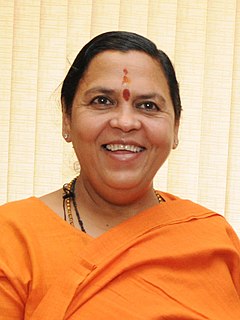
Uma Bharti is an Indian politician who currently serves as the Cabinet Minister for Drinking Water and Sanitation in the Union Government of India and was Appointed National Vice President of Bharatiya Janata Party in March 2019. She became involved with the Bharatiya Janata Party (BJP) at a young age, unsuccessfully contesting her first parliamentary elections in 1984. In 1989, she successfully contested the Khajuraho seat, and retained it in elections conducted in 1991, 1996 and 1998. In 1999, she switched constituencies and won the Bhopal seat.
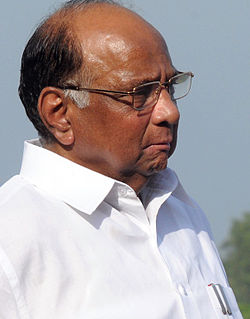
Sharad Govindrao Pawar is an Indian politician who serves as the president of the Nationalist Congress Party which he founded in 1999, after separating from the Indian National Congress. He previously served as the Chief Minister of Maharashtra on three separate occasions and held the posts of Minister of Defence and Minister of Agriculture in the Government of India. Pawar hails from the town of Baramati in the Pune district of Maharashtra. He is a member of the Rajya Sabha where he leads the NCP delegation. He holds a position of prominence in national politics as well as the regional politics of Maharashtra.
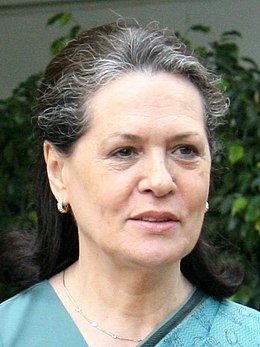
Legislative elections were held in India in four phases between 20 April and 10 May 2004. Over 670 million people were eligible to vote, electing 543 members of the 14th Lok Sabha. The Lok Sabha, or "House of the People," is the directly elected lower house of the Parliament of India.
The Liberhan Commission was a long-running inquiry commissioned by the Government of India to investigate the destruction of the disputed structure Babri Masjid in Ayodhya in 1992. Led by retired High Court Judge M. S. Liberhan, it was formed on 16 December 1992 by an order of the Indian Home Union Ministry after the demolition of the Babri Masjid in Ayodhya on 6 December and the subsequent riots there. The Commission was originally mandated to submit its report within three months. Extensions were given 48 times, and after a delay of 17 years, the one-man commission submitted the report to Prime Minister Manmohan Singh on 30 June 2009. In November 2009, a day after a newspaper published the allegedly leaked contents of the report, the report was tabled in Parliament by the Home Minister P. Chidambaram.
Sitaram Kesri was an Indian politician and parliamentarian. He became a union minister and served as President of the Indian National Congress from 1996 to 1998.
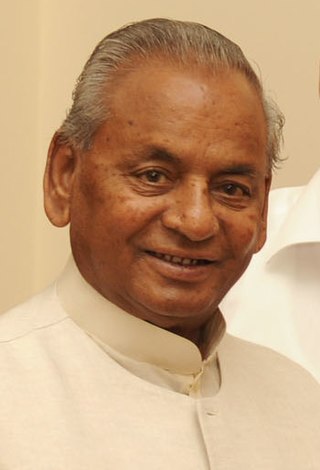
Kalyan Singh is the current Governor of Rajasthan since 4 September 2014. He took additional charge of Himachal Pradesh replacing Urmila Singh, whose five-year term ended on 24 January 2015. Prior to that, he was an Indian politician of the Bharatiya Janata Party from the state of Uttar Pradesh. Kalyan Singh was born to Tejpal Singh Lodhi and Sita on 5 January 1932. He has served two terms as the Chief Minister of Uttar Pradesh and was appointed Governor of Rajasthan on 26 August 2014. Kalyan Singh is known for his role in the Babri Masjid demolition. Addressing reporters in Etah, Kalyan Singh once said that he owns full responsibility for the demolition of the 16th-century mosque in Ayodhya on 6 December 1992, thus reigniting the controversial Ram Janmabhoomi dispute. During a speech at the 26th convocation ceremony, he appealed against the word ‘Adhinayak’, saying it should be replaced by 'Mangal'.

India held general elections to the 15th Lok Sabha in five phases between 16 April 2009 and 13 May 2009. With an electorate of 714 million, it was the largest democratic election in the world till the Indian General Elections 2014 held from 7 April 2014.

The Indian general election of 1951–52, held from 25 October 1951 to 21 February 1952, was the first election to the Lok Sabha since India became independent in August 1947. It was conducted under the provisions of the Indian Constitution, which was adopted on 26 November 1949. Elections to most of the state legislatures took place simultaneously.

General elections were held in India in 1989 to elect the members of the 9th Lok Sabha. V. P. Singh united the entire disparate spectrum of parties including regional parties such as the Telugu Desam Party, the Dravida Munnetra Kazhagam, and the Asom Gana Parishad, forming the National Front with N.T.Rama Rao as President and V. P. Singh as convenor with additional outside support from the Bharatiya Janata Party and Communist Party of India (Marxist) led Left front they defeated Rajiv Gandhi's Congress (I) in the 1989 parliamentary elections.

The 1990s was a historic decade in India. Economic growth rates increased as policies were liberalised though not as quickly as in China. Urbanisation was also very slow compared to that in China. Rate of growth of population and fertility rates decreased. Infant mortality rates saw good rate of decrease. Two polarising trends emerged in national politics - that of the politics of social justice based on caste which followed the implementation of Mandal commission report, and of the politics of religion based on Hindu nationalism, which was marked by demolition of the Babri Masjid in 1992 and the subsequent communal riots.
Ramtek Lok Sabha constituency is one of the 48 Lok Sabha (parliamentary) constituencies in the state of Maharashtra in western India. The constituency did not exist during the Indian general elections of 1951-52 for the 1st Lok Sabha. It was created for Indian general election, 1957 for the 2nd Lok Sabha, with abolition of the Amravati West constituency in the neighbouring Amravati district.
Jalna Lok Sabha constituency is one of the 48 Lok Sabha (parliamentary) constituencies in Maharashtra state in western India.

The Indian general election, 1991 polls in Tamil Nadu were held for 39 seats in the state. The result was a repeat landslide victory for Indian National Congress, and its ally Anna Dravida Munnetra Kazhagam, winning all 39 seats. The opposition party Dravida Munnetra Kazhagam, which was part of the National Front, lost heavily, not winning a single seat. During this election, Rajiv Gandhi was assassinated, when campaigning for Margatham Chandrasekar for the Indian National Congress, in the Sriperumbudur constituency.

Chandra Shekhar was an Indian politician who, served as the eleventh Prime Minister of India, between 10 November 1990 and 21 June 1991. He headed a minority government of a breakaway faction of the Janata Dal with outside support from the Indian National Congress as a stop gap arrangement to delay elections.Chandrasekhar is the first Indian Prime Minister who has never held any Government office. His government was largely seen as a "puppet" and "lame duck" and the government was formed with the fewest party MPs in the Lok Sabha of the Congress. His government could not pass the budget at a crucial time when Moody had downgraded India and it further went down after the budget was not passed and global credit-rating agencies further downgraded India from investment grade making it impossible to even get short term loans and in no position to give any commitment to reform the World Bank and IMF stopped their assistance. Chandrasekhar had to authorise mortgaging of gold to avoid default of payment and this action came in for particular criticism as it was done secretly in the midst of the election. The Indian economic crisis, 1991, and the Assassination of Rajiv Gandhi plunged his government into crisis.

The 2019 Indian general election is scheduled to be held in seven phases from 11 April to 19 May 2019 to constitute the 17th Lok Sabha. The counting of votes will be conducted on 23 May, and on the same day the results will be declared.
In June 1992 a by-election was held for the New Delhi seat in the Lok Sabha. The by-election was called after the resignation of the incumbent Member of Parliament L.K. Advani.
Kamala Kumari Kareddula is an Indian politician. She was elected to the Lok Sabha, the lower house of the Parliament of India from the Bhadrachalam, Andhra Pradesh as a member of the Indian National Congress.
